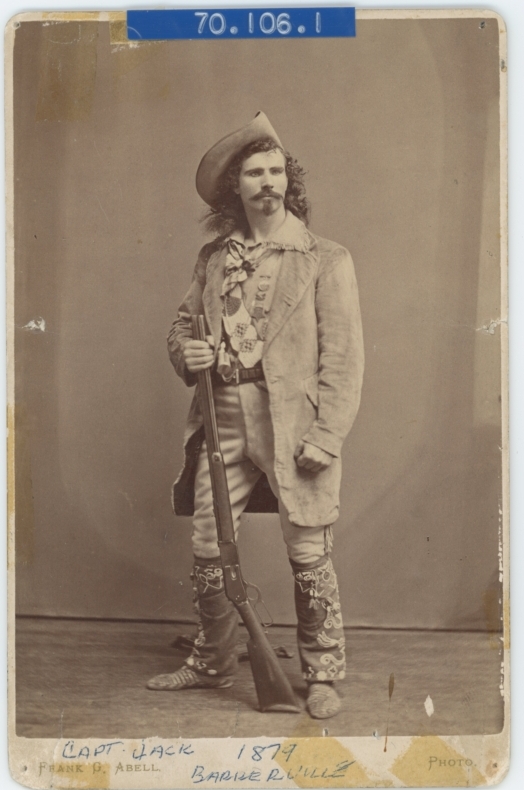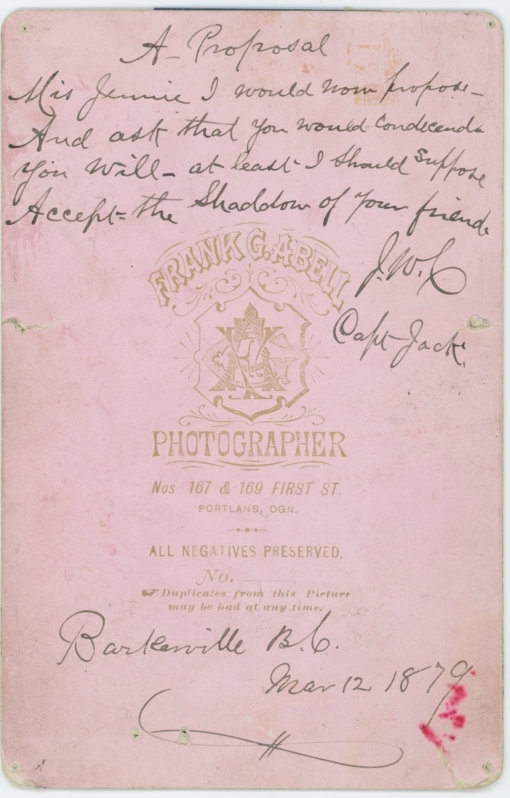During the Gold Rush era of the late 1800s, travelers of every rank and renown found themselves passing through Clinton on their way to the goldfields further north. Among them was Captain Jack Crawford, a colorful figure known as the “Poet Scout,” whose adventures took him all across the frontier. However famous Captain Jack may have been in show bills and news clippings, these two historic photos—from the frontiersman posed in buckskins to the playful poem scribbled on the reverse—remind us that everyone, no matter how notable, shared a common route through small towns like Clinton.
A Portrait from Portland, Bound for Barkerville
One photograph shows Captain Jack in 1879, striking a frontier pose in a studio. Look closely and you can see the photographer’s imprint: Frank G. Abell, Nos. 167 & 169 First St., Portland, Ogn. It was not uncommon for itinerant adventurers to have their likeness taken at a big-city studio before traveling north.
Barkerville, B.C.—a famed Cariboo Gold Rush hub—lies well past Clinton along the Cariboo Wagon Road. The date “March 12, 1879” on the photo’s reverse places Captain Jack in Barkerville at that time, but he almost certainly would have stopped in Clinton en route. Towns like Clinton offered more than hot meals; they served as places to gather news, rest horses or mules, and stock up on last-minute supplies.
The Playful Poem on the Back
On the pink reverse side of the photo mount, Captain Jack penned a short rhyme addressed to someone named “Miss Jennie.” Titled “A Proposal,” it reads:
“Miss Jennie I would now propose
And ask that you would condescend
You will — at least I should suppose —
Accept — the shadow of your friend.”
J.W.C., Capt. Jack
This rhyme—calling a photograph the “shadow” of one’s friend—captures the lighthearted nature of Captain Jack’s personality. Whether he had romantic intentions or was simply offering a souvenir, the inscription speaks to a more personal side of a man otherwise known for his brash frontier exploits and scouting skills.
Clinton as the Unlikely Great Equalizer
In those days, the roads through Clinton were filled with dreamers, adventurers, seasoned gold hunters, and occasional celebrities like Captain Jack. The simple realities of travel—fresh horses, a warm bed, the latest map updates—applied equally to all. Clinton’s significance lay in its location: perched along one of the main routes to Barkerville and the Cariboo goldfields beyond, the village was an essential checkpoint no matter who you were or how grand your reputation might be elsewhere.
In fact, many travelers found Clinton’s hospitality and resources as welcome as the possibility of gold itself. Stories of travelers brushing shoulders with future legends, or discovering vital information from an old-timer at a local tavern, gave Clinton the kind of lore that turned roadside stops into foundational chapters of the Gold Rush saga.
Discovering the Spirit of an Era
Today, the quiet village of Clinton still echoes with these historic tales. Standing along the Cariboo Highway, it invites modern visitors to imagine the 19th-century hustle and bustle—wagons rumbling, riders arriving in a swirl of dust, and fortunes made or lost just up the road.
The two images of Captain Jack Crawford give us a tangible glimpse into this world:
In many ways, these photos encapsulate the dual nature of the Gold Rush traveler: the daring performer determined to chase riches and glory, and the ordinary human being who stopped to rest and exchange tokens of friendship with people met along the way.




 Community
Community Council
Council Reports &
Reports &
